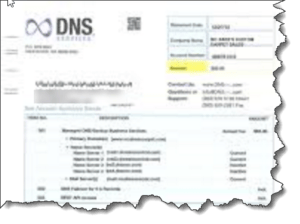Domain Name Scam
 Domain Name Scam: a reader asks…
Domain Name Scam: a reader asks…
I’m a small business owner with a website (hosted by GoDaddy.com). I recently received a bill in the mail (physical, not email). It is from the Internet Domain Name Services (IDNS) and it is a Domain Name Expiration Notice. States that my domain name expired in February. Before I pay the bill, should I be concerned about this?
In four words: don’t pay that bill! So-called DNS agents are marketing domain name services like crazy, often via email and even postal mail. It is almost certain that you reserved your domain name through GoDaddy.com when you purchased your website hosting plan. That makes GoDaddy.com your domain name reservation agent, and any legitimate reservation renewals will come only from them. Everything else is a marketing attempt.
With Domain Names (like PosiTek.net, GoDaddy.com, Google.com, etc.) the name is actually rented, not purchased. You rent (e.g., reserve) the domain name from an authorized agent. Almost all agents have auto-renewal set up for their clients’ accounts, so as long as you keep a valid credit card on file with your GoDaddy.com account, you don’t have to worry about the reservation expiring. Most reservations are made on an annual basis, but you can also pay more up-front and get a longer reservation, often at a discount for the regular annual rate.
 So feel free to file that ‘bill’ in the circular file (e.g., trash) as it’s nothing but a marketing attempt to get your business. Furthermore, so many of these types of marketing schemes are being perpetrated on us small business owners as a scam – pay the bill and you really get nothing from it. Other scam types you might see include international domain name copyright protection bills, fake notifications that your website is infected with malware, and scams involving so-called protection for your website.
So feel free to file that ‘bill’ in the circular file (e.g., trash) as it’s nothing but a marketing attempt to get your business. Furthermore, so many of these types of marketing schemes are being perpetrated on us small business owners as a scam – pay the bill and you really get nothing from it. Other scam types you might see include international domain name copyright protection bills, fake notifications that your website is infected with malware, and scams involving so-called protection for your website.
I don’t know your business or the functionality of your website, but as a small business owner, you might consider obtaining good third-party website scanning to watch for and notify you if your website gets compromised. Here at PosiTek.net, we use a trusted service from a respected company: Sucuri.net. They constantly scan your website and notify you instantly if the site has been hacked. Plus, they provide tools to disinfect your site, should it get infected with malware. If your website is at all important to your business model, you want to make sure it doesn’t get blacklisted as a result of being compromised,and Sucuri will help there as well. Their full protection is $20/month which isn’t cheap, but offers the most complete protection available. They also offer a more basic plan for $10/month (see their offering comparison here). Another alternative is SiteLock Website Security, and I know that GoDaddy offers this as an add-on feature for their website hosting plans.
![]() All that said, if your website doesn’t offer any interactive functionality for site visitors and is basically an expanded ‘business-card’ style website, then services like Sucuri may be overkill. For many small business owners, simply having a good backup of your website can be enough. Be sure to know exactly how to restore your website from the backup. If you ever have to do this, time will be of the essence and you may be in a bit of a panic – that’s not the time to be fumbling around trying to figure out how to restore your website! You can also call upon the services of your website hosting company (in your case, GoDaddy.com). Often their technical support can help you restore your site to it’s pre-infected state.
All that said, if your website doesn’t offer any interactive functionality for site visitors and is basically an expanded ‘business-card’ style website, then services like Sucuri may be overkill. For many small business owners, simply having a good backup of your website can be enough. Be sure to know exactly how to restore your website from the backup. If you ever have to do this, time will be of the essence and you may be in a bit of a panic – that’s not the time to be fumbling around trying to figure out how to restore your website! You can also call upon the services of your website hosting company (in your case, GoDaddy.com). Often their technical support can help you restore your site to it’s pre-infected state.
![]() Lastly, these days just about every website is quickly moving to secure access. That’s the “s” in https://[yourdomainname]. Some website hosting companies include a basic SSL certificate (that’s the name of what you actually get to enable this feature) as part of their hosting agreements, some charge extra for it. Even if your website doesn’t have any site visitor interaction, serving up only secure web pages is a good idea for one reason: Google rankings take that into account when rating your website in their search engine. Someone doing a Google search for something similar to what your business offers will see SSL certificate site-secured websites before they see yours. Check with your website hosting company for pricing. GoDaddy currently has a ‘sale’ on basic SSL Certificates, $56/year.
Lastly, these days just about every website is quickly moving to secure access. That’s the “s” in https://[yourdomainname]. Some website hosting companies include a basic SSL certificate (that’s the name of what you actually get to enable this feature) as part of their hosting agreements, some charge extra for it. Even if your website doesn’t have any site visitor interaction, serving up only secure web pages is a good idea for one reason: Google rankings take that into account when rating your website in their search engine. Someone doing a Google search for something similar to what your business offers will see SSL certificate site-secured websites before they see yours. Check with your website hosting company for pricing. GoDaddy currently has a ‘sale’ on basic SSL Certificates, $56/year.
This website runs on a patronage model. If you find my answers of value, please consider supporting me by sending any dollar amount via:
or by mailing a check/cash to PosiTek.net LLC 1934 Old Gallows Road, Suite 350, Tysons Corner VA 22182. I am not a non-profit, but your support helps me to continue delivering advice and consumer technology support to the public. Thanks!






